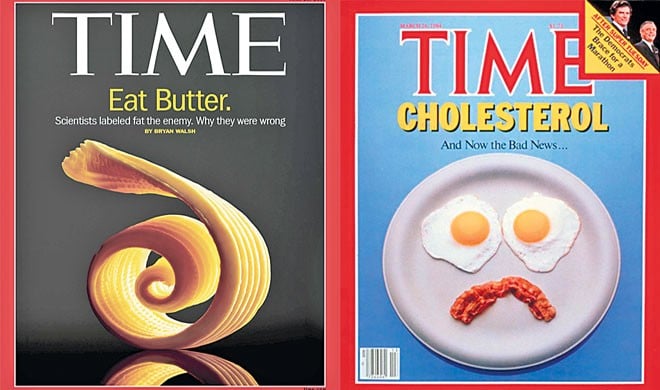
For decades, scientists have linked fat consumption to an increased risk of heart disease. Modern research, however, suggests that butter and egg yolk are not the villains we thought they were.

Some 30 odd years ago, a sad face made of fried eggs and bacon appeared on the cover of Time – officially vilifying egg yolk’s enmity with cholesterol.
A couple of months ago, a sexy, lazy, curvy photo of a flying slather of butter appeared on the cover of the same magazine. And that began the turn of this demonized fat into a glorified demigod.
Scientists seems to have reread science again and has now refuted the "fat free" belief which had brought about a tsunami of hopeless diets and an increase in slogans like ’99% fat free’ and ‘cholesterol free’ slapped across cereals, dairy and every other thing possible. Grocery lists with any ‘full fat’ item became non-existent and ‘skimmed’ became the word and diet of choice.
The two food items under consideration are butter and egg yolks, which have been maligned and avoided like the plague, wrongly accused of creating havoc with the normal functioning of the heart, misunderstood and majorly misconstrued all these years. We owe an apology to them!
High blood cholesterol is associated with heart diseases and saturated fat is believed to increase cholesterol. Rightly so, saturated fat does increase one of the components of cholesterol, the bad cholesterol, namely LDL. However, it is interesting to note that LDL consists of two particles, one the buoyant, benign one and the other a small dense, closely set one (linked to heart disease). And the good news is that saturated fat increases the number of fluffy benign particles and not the dense ones. Although there were always sparks of defiance of the above theory, recent clinical tests and trials have proved that a purely egg white diet compared to eating a whole egg has little or no effect on cholesterol levels.
So, if you have been ingesting bland egg white omelets and constantly sticking to ‘no yolks please’, it is time to reconsider. Put the sunny sides back in your diet and consume this healthy nutritional powerhouse with no fear (moderation is always a good idea).
With the blatant attack on fat all these years, food companies stripped fat from their products and compensated the loss with increased refined sugar and carbs. When fat was melted away from the diet it was replaced by processed foods and refined carbohydrates – which scientists now believe has been the main cause of obesity in the US.
The article (Time, 23 June, 2014) itself does not advocate increased butter consumption; however it does endorse the importance of saturated fat in our diet (again, moderation remains key). Joy Bauer, a prominent nutritionist in the US, explains that the article does not give us the license to slather butter on bread, bagels and pasta, yet it wants us to end the war against butter. "If you love butter, add a small amount on vegetables, not on a big hunk of bread…"
A quick Google search from various sources showed that France is one of the top five countries worldwide with the lowest rates of heart disease deaths followed by. "This may surprise you, given that the French diet is high in dairy, fats and red meat," says healthline.com.
With my hand on my heart (pun intended), I assure you that the above information is by no means an attack on Ancel Keys or an ode to tubs of butter and clutches of eggs, nor am I suggesting a move to France – it is a simple attempt to bring back moderate yellow sunshine in your life!
P.S. Ancel Keys is the American scientist who hypothesized the affect of dietary fat on health.